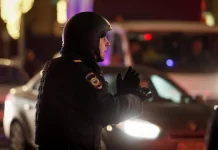Something odd and largely unnoticed is happening to Russia’s spies.
By Andrei Soldatov and Irina Borogan, for CEPA
Putin’s intelligence services are being cleansed of non-Russians, a policy completely at odds with the agencies’ multiethnic histories. It is a risky move that may one day bring serious consequences to the regime.
The change is happening despite the continuing decline in the ethnic Russian population and thus the growing proportion of minorities. While past intelligence services were always Russian-dominated, this has been strongly reinforced in recent years. According to the official 2021 Russian census, only about 72% percent of the population is ethnic Russian — six million fewer than in 2010. The country’s demographic crisis is now so severe — and politically discomforting — that officials this year halted public updates of the official figures.
And yet, if one looks through the list of high-ranking officials — that is, the heads of the key departments of the FSB, Russia’s main security service — one finds hardly any Tatars or, say, Chechens, the second- and third-largest ethnic groups in the Russian Federation.
Surprisingly, until recently, there were some ethnic Ukrainians among the bosses on Lubyanka Square, including in the infamous 5th Service, which so notably failed to provide accurate intelligence about the situation in Ukraine before the full-scale invasion of 2022. They have now all been replaced by ethnic Russians.
This total russification of the FSB leadership makes it strikingly different from Stalin’s secret services.
Despite constant purges, Stalin’s services remained highly capable and brutally efficient — due in no small part to their ethnic diversity. This was a legacy of the early Soviet secret police, which had absorbed the most ruthless and effective elements from the militant underground groups of the former Russian Empire.
These included Jewish staff, who had spent decades perfecting methods of konspiratsia while resisting Tsarist pogroms — often through criminal networks and revolutionary parties; Armenians, who had built a truly international movement aimed at avenging the perpetrators of the 1915 Armenian genocide; Georgians and other ethnic groups of the Caucasus, with their experience in funding the revolutionary movement by any means necessary, including robberies— it was through these operations that Stalin first made his name; and Latvians, whose legendary resilience in ethnic regiments of the Russian army during World War I earned them a reputation for toughness (many supported the Bolshevik revolution and became Lenin’s praetorian guard).
These ethnic groups had their own leaders, client networks, and shared interests — and Stalin made a sustained effort to suppress them, seeing such clans as a threat to his monopoly on power. His successors in the Kremlin redoubled these efforts by filling the ranks of the security services with Communist Party appointees.
And yet, Soviet leaders were pragmatic enough to allow so-called “national personnel” to lead KGB departments in the most sensitive Soviet republics.
Eduard Shevardnadze, Gorbachev’s foreign minister and later president of Georgia, had served as Minister of Public Order in Georgia from 1965 to 1968, and later as the republic’s interior minister. Geidar Aliyev, the first president of Azerbaijan, had a long career in the KGB and became head of the Azeri KGB in 1967.
But under Putin, the FSB has adopted a more aggressive and openly xenophobic approach. An FSB colonel — an ethnic Tatar — told these authors in the late 2000s about his experience of being transferred from the regions to Moscow to serve in the central apparatus. He was something of a believer in the state security cause — he had volunteered for the Soviet KGB as a young man and had spent years monitoring Islamist movements in Uzbekistan, where his Tatar (i.e., Muslim) background had come in handy. Eventually, he was promoted to serve in the counterterrorism department in Moscow.
According to tradition, he organized a welcome party for his new colleagues. During the gathering — held inside the Lubyanka building — his drunken boss suddenly confronted him with accusations about the Tatar-Mongol invasion. He demanded that the colonel apologize for what had happened in the 13th century. From that point on, the colonel took the precaution of giving a Russian rather than a Tatar name.
Apparently, the FSB colonel was not alone in facing such treatment.
An FSB general, Rashid Nurgaliev, rose to prominence thanks to Putin and his close associate Nikolai Patrushev — they had served together in Karelia. Promoted by Putin, Nurgaliev served as Minister of the Interior from 2004 until 2012 and has been a member of Putin’s Security Council ever since.
And yet, Nurgaliev was Tatar and Muslim, just like the colonel. Rumor had it that an FSB officer was assigned a sensitive mission: to convince Nurgaliev to be baptized as an Orthodox Christian — a mission that, once completed, earned the officer the rank of general. Apparently, conversion was set as a condition for Nurgaliev’s appointment as Interior Minister.
The FSB is a sprawling organization, with departments across Russia. In this environment — marked by total impunity and widespread corruption — the clan system and personal patronage inevitably play a major role in officers’ careers. But these modern clans are no longer ethnic; they are regional.
An FSB general promoted to Moscow will always try to bring with him trusted officers from the region where he previously served. Putin himself did the same when he had brought to Moscow the people he had served with in the St. Petersburg FSB.
The FSB today serves only one master: Vladimir Putin. Its corporate culture reflects the fears and prejudices of that one man. It embodies a paranoid, tribalistic, and almost medieval approach to the question of loyalty — one that assumes a man’s behavior is pre-determined by his ethnicity and religion rather than by his professional competence or education.
But such fear cuts both ways. Putin’s deep suspicion toward non-Russians reflects his anxiety that the country’s regions like Tatarstan and Chechnya (where the FSB local departments are led by ethnic Russians, unsurprisingly) might one day follow the path of the former Soviet republics and break away. And yet, by russifying the leadership of his security services, Putin may be only weakening his most important tool of control.
After all, how can his early-warning system detect regional crises if it excludes the very people most capable of recognizing the signs?
By Andrei Soldatov and Irina Borogan, for CEPA
Irina Borogan and Andrei Soldatov are Non-resident Senior Fellows with the Center for European Policy Analysis (CEPA). They are Russian investigative journalists and co-founders of Agentura.ru, a watchdog of Russian secret service activities. Their book ’Our Dear Friends in Moscow, The Inside Story of a Broken Generation’ was published in June.
Europe’s Edge is CEPA’s online journal covering critical topics on the foreign policy docket across Europe and North America. All opinions expressed on Europe’s Edge are those of the author alone and may not represent those of the institutions they represent or the Center for European Policy Analysis. CEPA maintains a strict intellectual independence policy across all its projects and publications.





